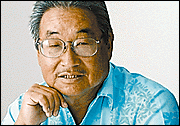


Sports Watch
SWEET Sixteen it wasn't. The NCAA expanded its baseball tournament with 16 more teams this season, but the University of Hawaii still couldn't make the field of 64. ’Bows must learn to
fly with the OwlsThe Western Athletic Conference, playing its third and final season as an 11-team baseball league, has only one representative to hoot about in the regionals - the league champion Rice Owls.
Rice and the 10 Dwarfs. Soon to be half that if the rest of the teams in the new WAC next season don't start recruiting more able-bodied ballplayers to keep up with the Owls.
The WAC can't complain about having only one team in the NCAA regionals.
Sure, a case could have been made for the Rainbows. UCLA, one of the teams to make it as an at-large selection despite a mediocre 30-29 record, was swept in a three-game series by UH.
But Texas Christian spoiled it all for the Rainbows and the rest of the league.
The 'Bows finished the season 37-20, but five of the losses were to the Horned Frogs. Talk about being hornswoggled.
Then what happens? The last ones standing to challenge Rice, the Horned Frogs, got skinned alive, 18-3, in the WAC tournament final.
So why should the NCAA pick the WAC's second-best team if it can do no better than lose by 15 runs to the league's champion?
Case dismissed.
THE Rainbows, for the most part, played as well as they could have played this season, according to coach Les Murakami.
Obviously, it wasn't good enough. Nobody in the WAC was good enough to come even close to Rice.
Having won the WAC title three straight years, the Owls have set a high standard for the rest of the league.
"That's why we've got to target Rice," said Murakami. "We've got to get better talent in order to compete with them."
The Owls reloaded with a bunch of junior college transfers this season, and Murakami feels he will have to go that way as well.
With that in mind, he leaves tonight for Grand Junction, Colo., to take in the national J.C. tournament.
"We've got to find some men, guys who can pop the ball. We've got the table-setters, but we need to get some guys who can hit the long ball," Murakami said.
In UH's case, because of Rainbow Stadium - a pitcher's, not hitter's park - at least players who can give the ball a ride.
Fly balls might be just long outs at home, but they could easily turn into home runs on the road, where one-half the WAC season is played.
WITH BYU, San Diego State, Air Force, New Mexico, Utah and Nevada-Las Vegas forming their own new league, the new WAC next year will be a six-team league with UH-Hilo joining UH, Rice, TCU, Fresno State and San Jose State as an affiliate member.
The WAC will play a 30-game schedule - three-game series home and away - and maybe a postseason tournament. A decision on the latter will be made later this summer.
In keeping with his play-anybody nonconference schedule, Murakami has already lined up Florida, UCLA and California on next year's schedule. For that reason, Murakami is glad that a proposal to start the college baseball season later and carrying it over into early summer died a merciful death.
What surprised him was that the so-called cold-weather schools turned it down.
Like everything else, cost was an overriding factor. A late-season start would have hurt UH's baseball program, especially in scheduling.